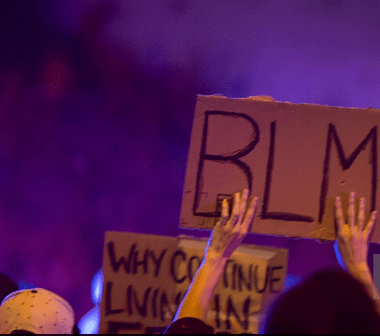The recent events on campus played out a fairly consistent pattern that I have noticed with demonstrations in relation to the Black Lives Matter movement.
It seems fairly consistent that Black Lives Matter protesters are focused on “starting a conversation.” And often these protests do start a conversation – but I am sure that the conversation is not the one that protestors were originally hoping to start.
For example, with the demonstrations here at SMU and the Kaepernick demonstrations, the conversations that are being had are on whether someone has the freedom of speech to demonstrate, how the national anthem should be honored and what patriotism is defined by.
– RELATED: SMU band members and students kneel at SMU vs TCU game
While these conversations may be important, they all diverge from the central issues that BLM wants to talk about – we had more conversations about freedom of speech and patriotism with the demonstrations of last week than we had about police brutality or any other BLM issues.
– RELATED: SMU protest draws national media reaction
And this gets played out across the nation – with arguments over whether protestors can and should do things like block streets, riot, etc. happening with more frequency than discussions over the merits of BLM’s points.
This leaves me confused as to what Black Lives Matter actually wants. Now before you go writing an email disparaging my “white privilege” and my blindness to the issues, hear me out.
It is obvious that the movement is centered around a lot of emotion and anger – there are people in our country who feel less safe and valued. And they are targeting “police brutality” as being the center of this issue.
However, past acknowledging that their cries have validity, I am not sure what else can be done for BLM supporters at the moment – I do not know what they want to happen past the vague “stop killing people.” The movement seems more focused on awareness than any kind of action: but in order to make progress won’t action have to be taken at some point?
Because while “stop shooting black people” is a valid point, just asking that or having some people respond will not bring change in and of itself. Some actions will certainly have to be taken in order for proper progress to be made, one would assume.
And I am at a loss as to what the desired actions might be. Because it would seem that just changing people’s minds is not enough to stop these perceived systemic issues if they are as large as claimed, something actually would have to be done from a governmental standpoint to rectify these issues.
And on that, what to do confuses me because at the core, police departments are not a federal or nationwide issue – they are not even a statewide issue. Police departments are managed on a city-to-city basis, so what national plans can be put in order to address the concerns? I know that Hillary Clinton suggested a “retraining” program for police officers, but I would hardly count her as speaking for the Black Lives Matter movement although I’d be interested to hear opinions on that.
What I would like to see is a conversation as to what BLM actually wants, the conversation that I think the protestors want to begin with. Is it as simple as just wanting an acknowledgement of: “Yes, you are right. African Americans get killed by the cops when they should not be” or does the movement want something more than that – actual actions? And if they want actions, what will they be? Disarm all cops? Federalize and retrain all police departments to “cultural sensitivity”? Would more cops who are African American help the issue?
Because aside from awareness, the emotional cries put forth by protestors again and again are not steps towards any tangible end goal, as far as I am aware. And I am confused as to whether there are any propositions as to what those next steps might be – and that is a conversation that will get us farther than discussing the merits of our national anthem ever will.









